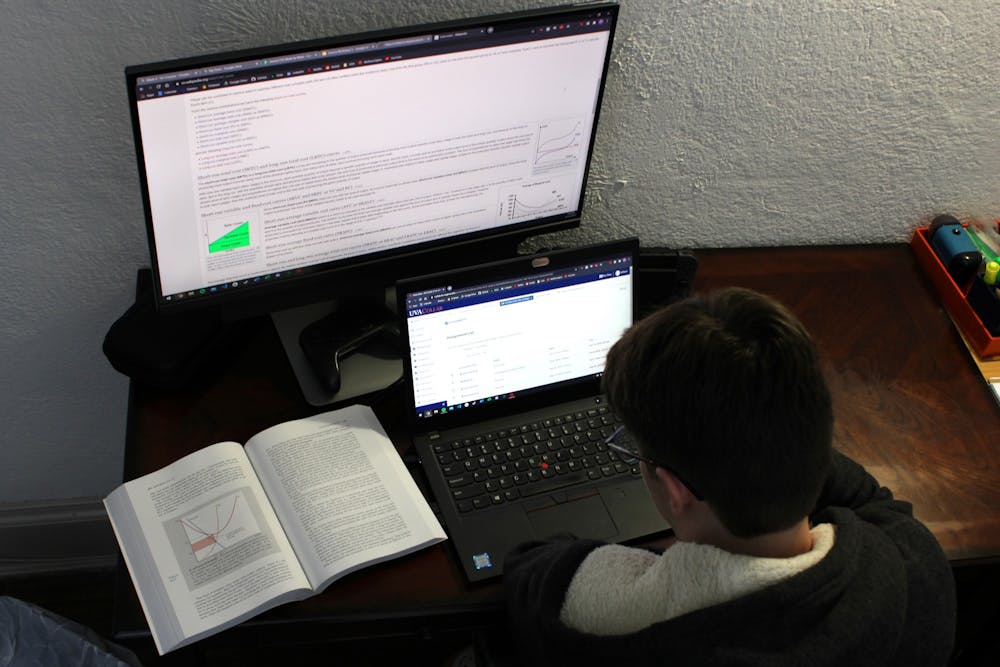中文版请点击此处
Cheating has recently become an important issue during the COVID-19 pandemic because of the online format many universities adopted. While the increase in cheating was expected, the draconian response some professors took in order to combat and persecute suspected cheaters was not. Reports of overreactions ranged from requiring students to scan their rooms before exams to asking unsolvable questions, seemingly to tempt students to cheat. Before privacy violations and borderline entrapment become normal, we should consider the alternative that is open book exams.
Anti-cheating measures have not been effective, despite the lengths professors and administrators have gone to combat it. According to the International Center for Academic integrity, 68 percent of undergraduates admit to cheating. The Honor Bicentennial Report, for reference, sees “between 40 to 60 cases per year” and has a “reporting rate of 0.002 cases per enrolled student per year.” For that reason, it is unlikely that the University's honor system reduces cheating in any marked way. Some proactive professors have already started to adapt during last semester’s online exams. They understood that with exams being online and mostly unsupervised, many students would be cheating. Accordingly, they sidestepped the problem by conducting open note exams, allowing crib sheets or modifying their course. They demonstrate that it’s possible to remove the capacity to cheat rather than trying to metaphorically plug holes in the ship. If everyone is permitted to use their notes or the internet, then it eliminates the advantage of using outside resources that cheaters traditionally enjoy. Furthermore, honest students no longer have to choose between their morality and watching their peers gain an unfair edge.
Beyond cheating, COVID-19 has also revealed another weakness in universities — how slowly we have adapted to integrating technology into education. Many older students will recall the mantra “You won’t always carry a calculator in your pocket.” Much like the pushback against calculator usage, closed book exams employ artificial constraints that seldom exist in the real world. There would be very few scenarios in which an employer would actively discourage someone using whatever tools necessary to solve problems. Having the internet vastly reduces the need for memorization, a trend that has been dubbed digital amnesia. However, losing skills we don’t have a need for as much is no loss. Surely, humans today are less able to hunt and forage compared to our ancestors, but is that really a negative? In this aspect, digital amnesia can actually help improve education by allowing students to focus on more complicated topics instead of learning information that is readily available.
Closed book exams also provide a crutch for substandard professors as well. Because a curriculum that is centered around rote memorization is easy to teach and grade, many professors give in to the temptation of creating generic exams that test for raw knowledge. These exams are a waste of time because there is little point in studying for and taking an exam if anyone with access to Google can achieve the same result. As a fourth-year, I am shocked at the amount of classes I’ve taken at the University that I could have nullified with a smartphone. As memorized knowledge is indistinguishable from internet augmented knowledge, one could do this without ever attending a single lecture. Open book exams would render memorization-based classes obsolete and force classes to adapt themselves to technology. If we assume students have access to all relevant information, then the class can spend more time focusing on higher concepts. For this, we must begin to see technology as a tool to learning rather than a hindrance.
That being said, the central issue to open books tests is that you cannot always rely on using outside resources to solve problems in the real world. A surgeon cannot Google how to perform an appendectomy on the table, nor can a pilot refer to his notes while flying. Both these situations require a mastery of knowledge in a timely manner. In this regard, open book exams better prepare students for these real world situations. In order to pass open book tests, students need a mastery of background knowledge prior to the exam, or they will spend the entire exam trying to learn the material or scanning their notes for the pertinent information. Freed from being able to assess whether students know the dirt-basics of a subject, open book exams will naturally test for problems that are more complex, relevant and cannot be Googled. These exams are naturally harder than closed book exams, for they place greater emphasis on “how” and “why” rather than the surface level “what” and “when” questions.
No system is perfect, and some exceptions and concerns are certainly warranted. Language classes, for example, are specifically meant for recalling information without having to look it up. And there will still be students that will find a way to cheat, even with the open book format. As it happens, a story came out a few months ago of students hiring experts to answer questions on Chegg. Nevertheless, if we gradually make open book exams the norm, we can optimize our finite time and energy to focusing on higher concepts rather than rote memorization.
Apurva Shrestha is an Opinion Columnist for The Cavalier Daily. He can be reached at opinion@cavalierdaily.com.
Views expressed are of the individual only and not those of the DoD or the Army. Columns represent the views of the authors alone and are not necessarily those of The Cavalier Daily.







